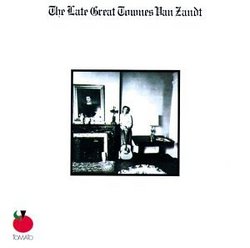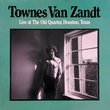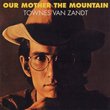| All Artists: Townes Van Zandt Title: Late Great Townes Van Zandt Members Wishing: 5 Total Copies: 0 Label: Rhino / Wea Release Date: 4/12/1994 Album Type: Original recording reissued Genres: Country, Folk, Pop Styles: Outlaw Country, Classic Country, Traditional Folk, Singer-Songwriters Number of Discs: 1 SwapaCD Credits: 1 UPC: 081227124229 |
Search - Townes Van Zandt :: Late Great Townes Van Zandt
 | Townes Van Zandt Late Great Townes Van Zandt Genres: Country, Folk, Pop
|
Larger Image |
CD DetailsSimilar CDs
|
Member CD ReviewsReviewed on 8/13/2023... Nope!
CD ReviewsLOST HIGH ROLLER ROLLING HOME 10/04/2000 (5 out of 5 stars) "I've been haunted by the cover for years.A meloncholy looking rake with guitar in the corner of some room he doesn't belong in. After a few years of touring,I felt it first hand. A drinking buddy turned me on to Townes in the end, saying REARVIEW MIRROR is all you need. I took his advice and passed it along till curiousity got the best of me and I picked up this record. Its acoustic, sparse and utterly beautiful with a strong undercurrent of sordidness. On "Sad Cinderella", he comes of like a hillbilly Leonard Cohen. "German Mustard" has Townes in a rare kind of form. Accompanied by a drunken slide guitar, he's shooting dogs and rambling on about "that German mustard 'tween your jeans". Actually I'm not sure whether he's saying jeans or knees, but I don't have to think too hard to get the implication. In my opinion,the song "Snow Don't Fall" is one the most haunting love songs this man has written. I often catch myself singing it low in waiting rooms. "Poncho & lefty" ofcourse is a classic. "The Silver Ships Of Andilar" is unlike anything else Townes recorded. A dark tale at sea that defies genres, it's nicely topped off by the sweet, but slightly ominous "House Boat In heaven". This album also features a stab at Hank Williams (" Honky Tonkin'") and a brilliant cover of Guy Clarke's "Don't Let The Sunshine Fool You". Throughout the years, this has become one of my favorite albums. Like Nick Drake's PINK MOON, I never sicken of it and I take it with me everytime I leave town. It's there for you, when one is in need of solace, yearning and a little bit of wickedness. He deserved more recognition in his life time, but sometimes well kept secrets keep the connection personal. Townes, R.I.P." Prophetically titled... B. Bowman | Jersey, United States | 07/06/2007 (5 out of 5 stars) "I have to preface this review by saying that it took me years to fully appreciate this album. I first bought it at a time when I was too closed minded to anything that could be labeled "country music", and immediately disliked what I heard. It was only through time that I realized that trying to put any other label on Townes Van Zandt aside from "songwriter" is completely pointless; he's not a "country" singer, not quite a "folk" artist, and not a "blues" performer, yet he managed to take all these elements and throw them into the mix that became his music. Perhaps the fact that his music can't be easily classified may explain his maddening lack of success during his life time. Having said that, "The Late Great Townes Van Zandt" was the album that brought Townes as close as he would get to recognition early in his career before management problems put him in a tailspin that delayed the acknowledgement of his talent for many years. This album contains what are arguably Townes' best known songs: "Pancho And Lefty" (later made famous by Willie Nelson and Merle Haggard's version, as well as Emmylou Harris's version), and "If I Needed You", which has been covered by numerous artists. (Townes also claimed to have written "If I Needed You" in his sleep, which if he did is amazing considering he always maintained that he never changed the words he originally wrote down or edited them in any way.) This album definitely has more country leanings than some of Townes' other albums, with covers of Hank Williams' "Honky Tonkin'", Townes' friend and fellow songwriter Guy Clark's "Don't Let The Sunshine Fool Ya", and the classic "Fraulein", which Townes continued to play in his live set for years after this album was released. The odd blues song "German Mustard" is also noteworthy; its off the cuff feel makes you wonder if this was a product of a few drinks in the studio. To me the most affecting track off of this disc is "Snow Don't Fall", which also is not a song mentioned much in Townes' catalog of work. Townes is accompanied only by piano, which in itself is unique in that his guitar playing isn't featured. Years after hearing it for the first time I read that Townes was inspired to write this song and "Two Girls" about the stabbing death of one of his girlfriends in California. Both songs take on greater meaning when listened to in this context and are extremely moving. Lastly, I would be remiss if I failed to comment on the contrast between the excellent album cover photo and the photo on the back. Townes himself explained the circumstances of both pictures in Margaret Brown's fascinating documentary "Be Here To Love Me", and really had me laughing with his description of his proper mother and aunt asking the guy behind the counter at the record store who the guy was on the back of the album that was giving the finger to the camera. Priceless. I wouldn't go so far as to recommend this as a starting point to a newcomer to TVZ's music, but if you are a fan this aptly titled album should be in your collection."
|

 Track Listings (11) - Disc #1
Track Listings (11) - Disc #1

